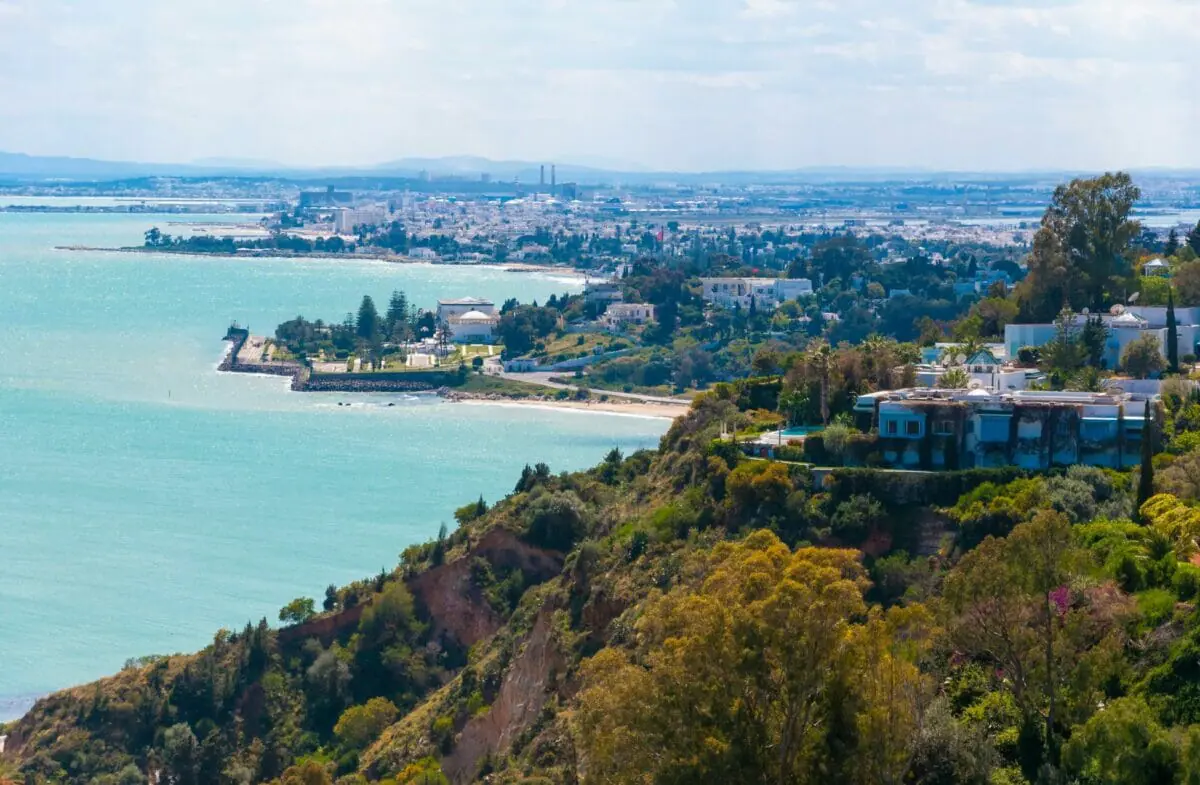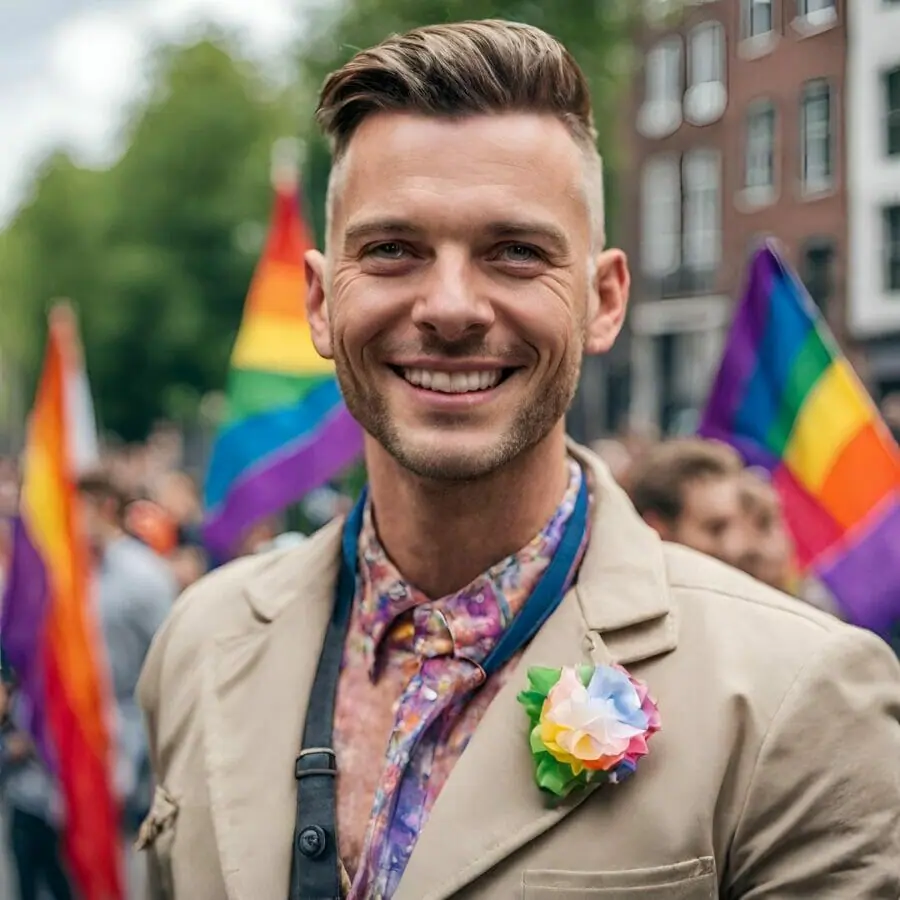From its awe-inspiring Roman and Punic ruins to its ancient and resplendent Medina, Tunis is a city steeped in rich history and culture. Its strategic ports were coveted and fought over, and multiple influences from the Roman, Arab-Muslim, Phoenician, Ottoman and French empires continue to make it the beautifully diverse and cosmopolitan city it is today.
Among the Arab countries, Tunisia is considered one of the most modern and open-minded nations. This is mostly attributed to its democratic political system and relatively progressive women’s rights. Polygamy is illegal in Tunisia, and women can attend mixed schools, marry non-muslim men, and travel and live by themselves freely. The situation for queer Tunisians could not be farther from this, though.
Article 230 of the penal code of Tunisia outlaws same-sex relations with crimes punishable by up to three years in prison. The existence of this law, along with the teachings of Islam on homosexuality, combine to create an exceedingly challenging and dangerous environment for queer people in Tunisia.
Further, articles 125, 225, and 226 of the Penal Code are used together with article 230 to legitimize discrimination and violence against the queer community. Consequently, queer Tunisians suspected of ‘sodomy’ can be arrested on appearance only, with over 120 people arrested annually since 2018.
Physical violence, rejection by their families, anal probing, death, and rape threats are some of the challenges gay Tunisians have to contend with.
As is always the case, there are some glimmers of hope to be found. There are a group of individuals and organizations actively fighting for the repeal of Article 230 of the penal code and for the rights and freedoms of queer Tunisians. Association Shams, an organization championing gay rights in Tunisia, was registered in 2015.
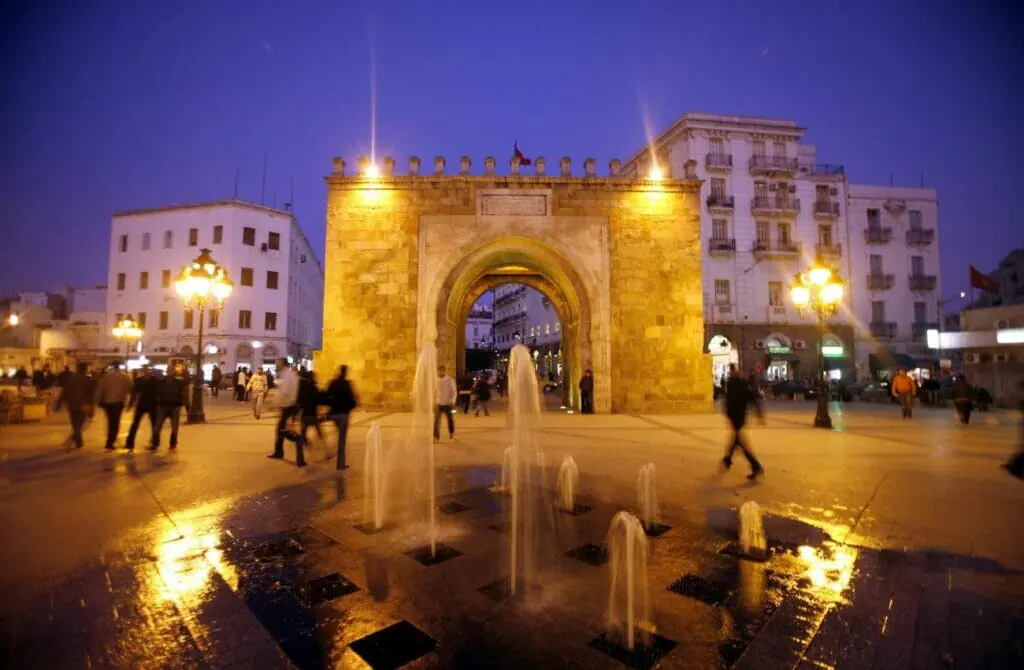
Their registration was challenged several times by the government but was finally upheld in 2020 by the Court of Cassation, the highest court in the country. The organization also began Radio Shams in 2017 to give a voice to queer people in North Africa. In 2018, Individual Freedoms and Equality Committee, commissioned by the then president, Beji Caid Essebsi, gave decriminalization of homosexuality as one of its recommendations, with a second option of lowering the punishment to a fine.
Mawjoudin Initiative for Equality is the other queer organization founded in 2014 that organized a first-of-its-kind film festival in North Africa called the Mawjoudin Queer Film Festival in 2018 and 2019 in downtown Tunis.
In 2019, Mounir Baatour, one of the co-founders of Association Shams, became the first openly gay presidential candidate in the Arab world, although his candidacy was later rejected by the election authority. In December 2021, a case was filed in the Court of Cassation challenging Article 230 of the penal code of 1913 after two men were arrested and given a one-year sentence in 2020.
Gay travelers visiting Tunis are not safe from Article 230, especially where paying for sex is involved. Cases of tourists being arrested are documented, including one of a Swedish man and a Belgian man who got sentenced to two years and three years in prison, respectively.
Public displays of affection are also a big no-no in Tunis, even in bars and nightclubs, because they can lead to physical violence and arrests. Paying for sex is also dangerous, as it can easily result in blackmail, extortion, and even arrests in some instances.
Still, the city has a long history of hustlers, some queer and others“gay for pay” men, who will proposition you the moment you make eye contact on the street, on the beach, or in a club. Travelers should use utmost caution and discretion when dealing with them.
Gay travelers are not safe in Tunisia and should avoid visiting the country for the sake of their freedom and safety. If you really, really want to visit despite the aforementioned challenges, you will find a wide range of attractions and great experiences waiting for you in Tunis.
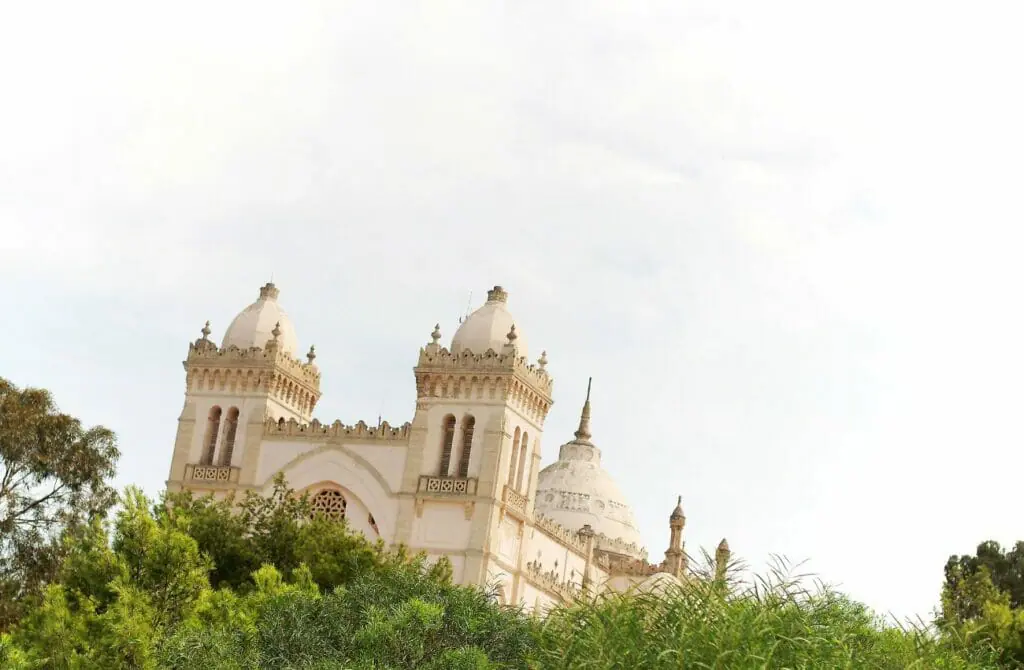
In this article we will cover...
Attractions in Gay Tunis, Tunisia
Tunis offers little to nothing in terms of queer life and experiences. Gay travelers will instead want to go out and explore the city’s ancient architecture and rich cosmopolitan culture, do some shopping, or even take a day trip out of the capital. To ensure a pleasant and stress-free stay in Tunis, queer travelers should avoid public displays of affection and drink in public outside designated areas.
Top Highlights in Tunis
The Medina district is the historical center and main attraction of the city of Tunis. Colorful doors line the narrow meandering cobblestone alleys that usher you into this ancient city and UNESCO Heritage Site, with over 700 ornate monuments, including mosques, palaces, madrasas, and mausoleums built over centuries.
Places to check out and things to see in the Medina are simply inexhaustible. Shoppers in search of authentic Tunisian souvenirs will be spoilt for choice at the many souks located throughout the city, from traditional caps and fabrics to perfume.
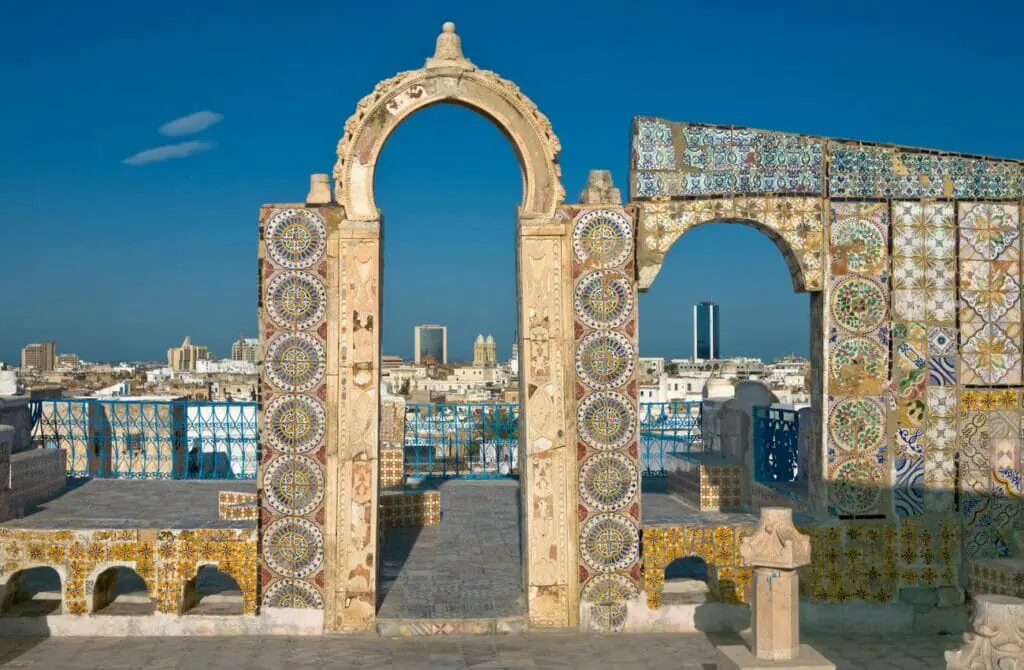
Located 15 kilometers from the center of Tunis, Carthage is an ancient Phoenician seaside city that was once the capital of the powerful Punic empire before the Romans destroyed it.
Visitors to this Unesco Heritage Site will enjoy exploring the ruins of the ancient city, the contentious tophets at Carthage, the Carthage Museum, and the remains of the once-famous and coveted ports of Carthage. While at Carthage, make sure to sample some bread or croissants at one of the city’s many Parisian-style boulangeries.
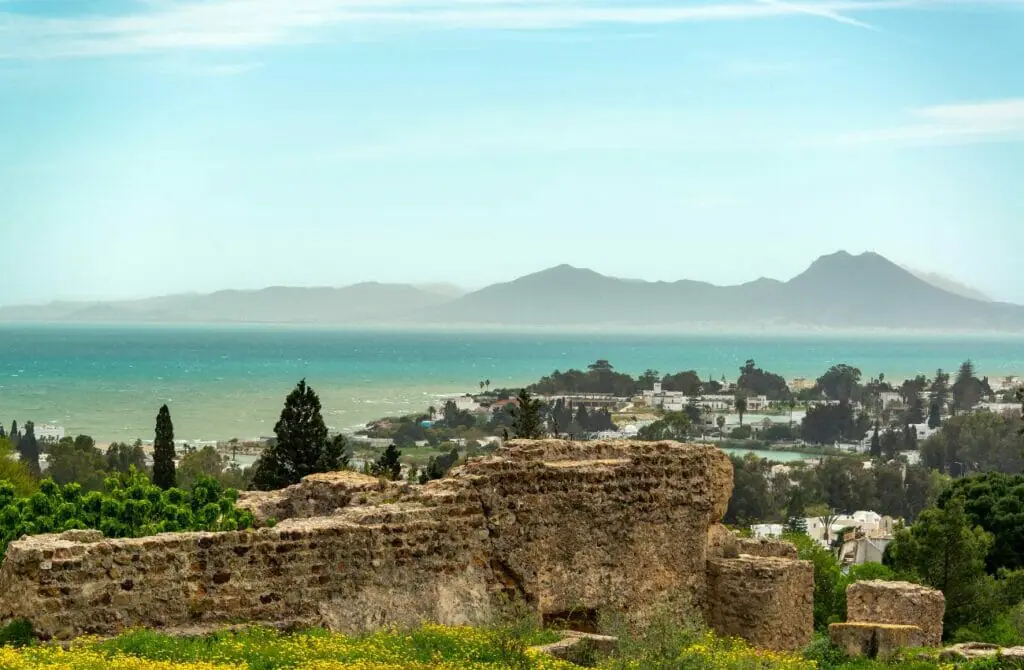
Tunisia owns one of three world-renowned mosaic art collections, with the other two located in Turkey. The National Bardo Museum hosts this collection which has pieces collected from all corners of the country and is a must-visit for lovers of archeology and history.
Highlights include the surprisingly well-preserved Hellenistic and Roman eras mosaic floors in their Odysseus, Dougga, and Sousse rooms. The museum also hosts non-mosaic exhibits from the Christian and Islamic eras located on the ground floor that should also catch your interest.
Sidi Bou Said is a picturesque Andalusian village perched high on a cliff overlooking the Mediterranean Sea. This charming little town began as an artists’ commune and is the perfect place for a leisurely stroll. Its stucco palaces are a sight to behold, and the cobblestone streets, white walls, and blue doors will have you thinking of Santorini.
Travelers should visit the many art galleries in the town, check out the boutiques for souvenirs, and then enjoy an al fresco dining experience with spectacular seaside views at one of the artsy cafes.
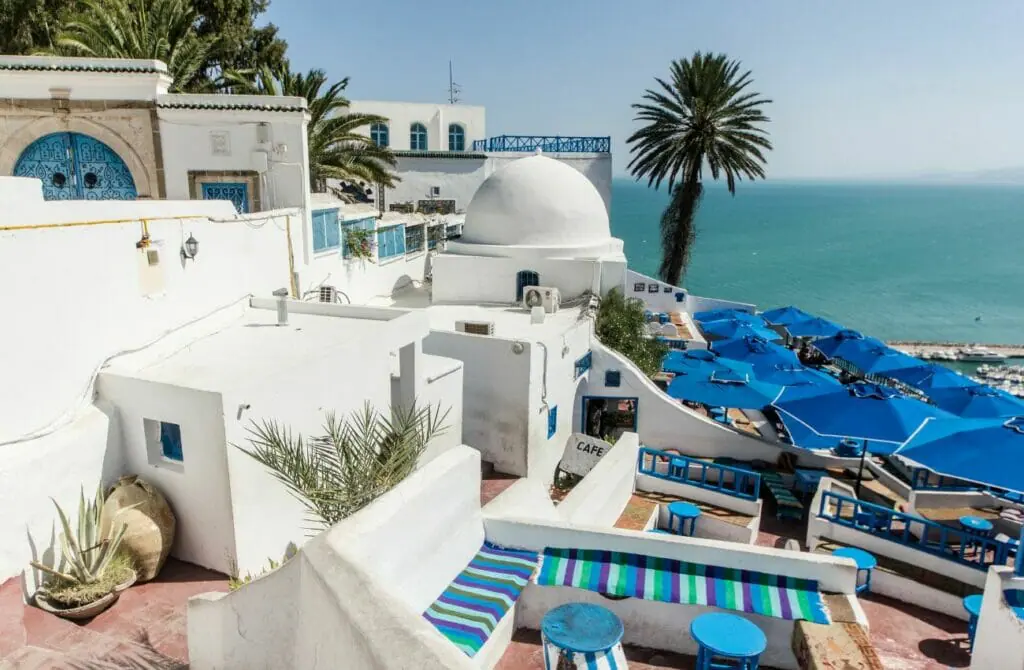
Belvedere Park and Museum of Modern Art
When looking to escape the hubbub of the city and catch a breath, travelers can pop in and check out the Parc du Belvédère with its lush greenery, fountains, and trails for walking and cycling. Whilst there, visit the Museum of Modern Art to see a wide collection of art from Tunisian artists and a small zoo that surprisingly has a wide variety of animal species.
While the Medina of Tunis represents the city’s old town, the Ville Nouvelle (new town) is located along Avenue Habib Bourguiba, Tunis’s central thoroughfare. Lined with beautiful eucalyptus and palm trees lining its middle section, the avenue is the political and economic hub of the city and was named after Tunisia’s first president.
Often compared to the Champs-Élysées in Paris, the avenue is lined with high-end and boutique hotels, designer shops, artsy street cafes, and supermarkets. Explore the traditional, colonial, and modern architectural mix of central Tunis, with highlights being the St. Vincent de Paul Cathedral, Hotel du Lac, and the government buildings.
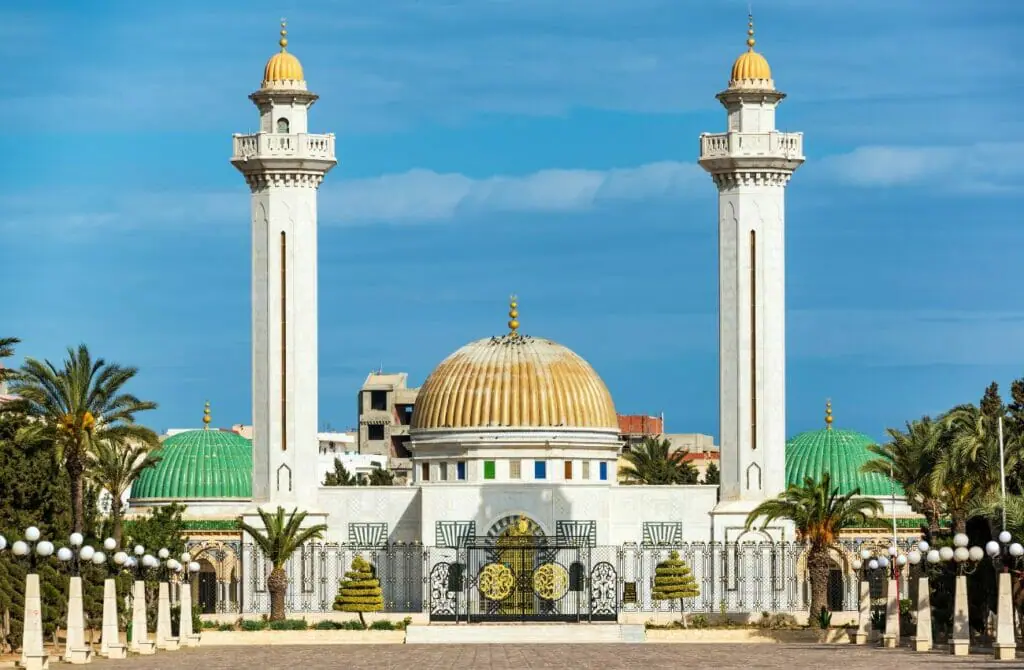

Gay Things To Do In Tunis
As a new visitor to Gay Tunis, it’s important to be aware that being queer is illegal in this city and country, and any same-sex activity should be absolutely avoided to ensure your safety. However, there are still plenty of things to see and do that do not involve expressing your sexual orientation.
One of the best ways to experience the city is to visit its most iconic landmarks and attractions, including historical monuments, museums, and art galleries. You can also admire the city’s architecture, explore its parks and gardens, sample local cuisine, and visit local markets. Additionally, cultural events such as festivals, concerts, and shows can provide a glimpse into the local culture.
We feel it’s important to acknowledge the challenges and risks associated with visiting destinations where same-sex activity is illegal. However, we still believe in the power of cultural exchange and the value of experiencing diverse cultures, even if we may not agree with their laws and customs.
Visiting queerphobic destinations allows us to learn about the local culture, history, and traditions and to gain a deeper understanding of the challenges faced by LGBTQ+ communities in those places. It also provides an opportunity to connect with local people, hear their stories, and show solidarity with the queer community.
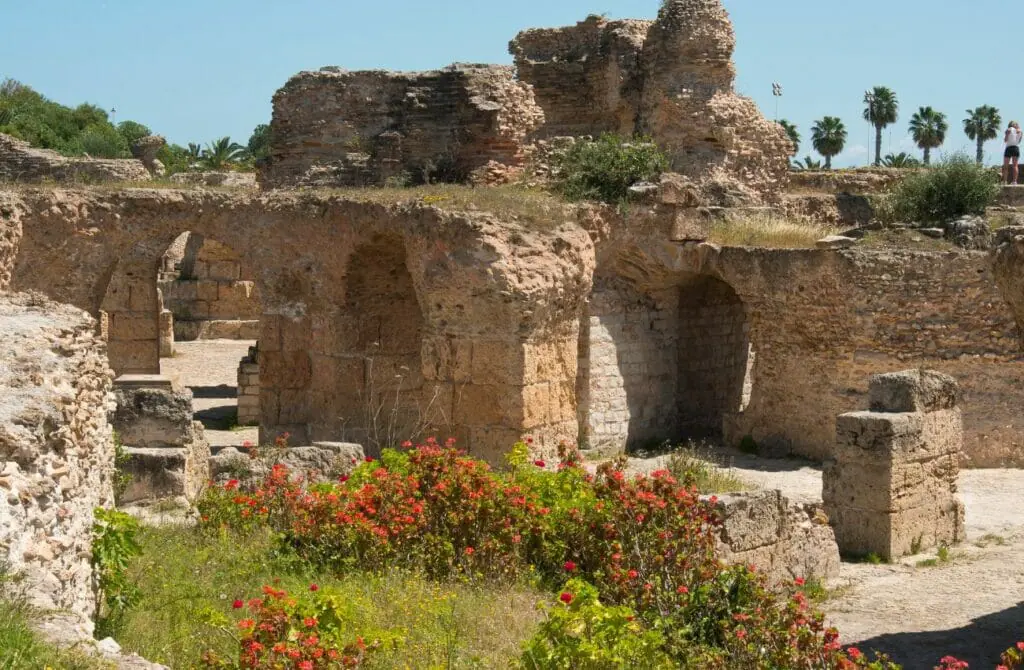
It’s important, however, to be mindful of the risks and to take steps to ensure our safety and the safety of local queer people. This may include avoiding public displays of affection, not discussing our sexual orientation with strangers, and being aware of local laws and customs.
As we explore these destinations, it’s crucial to spare a thought for local queer people who may face discrimination, persecution, and even violence due to their sexual orientation.
We might also have the opportunity to use our platform to amplify their voices and to support local organizations working to protect and advocate for LGBTQ+ rights – however, this is best done once you have left (and if you reside in a gay-friendly country!).
While it may not always be easy or safe to visit queer-illegal destinations, we believe that cultural exchange and understanding can help bridge divides and promote acceptance and tolerance. Let’s continue to explore the world while keeping in mind the experiences, struggles, and restrictions on LGBTQ+ expression in this city and country.
Thankfully, it’s still possible to enjoy the city’s attractions and learn about its culture while being mindful of local laws and customs.
These are our recommended must-see attractions in Tunis.
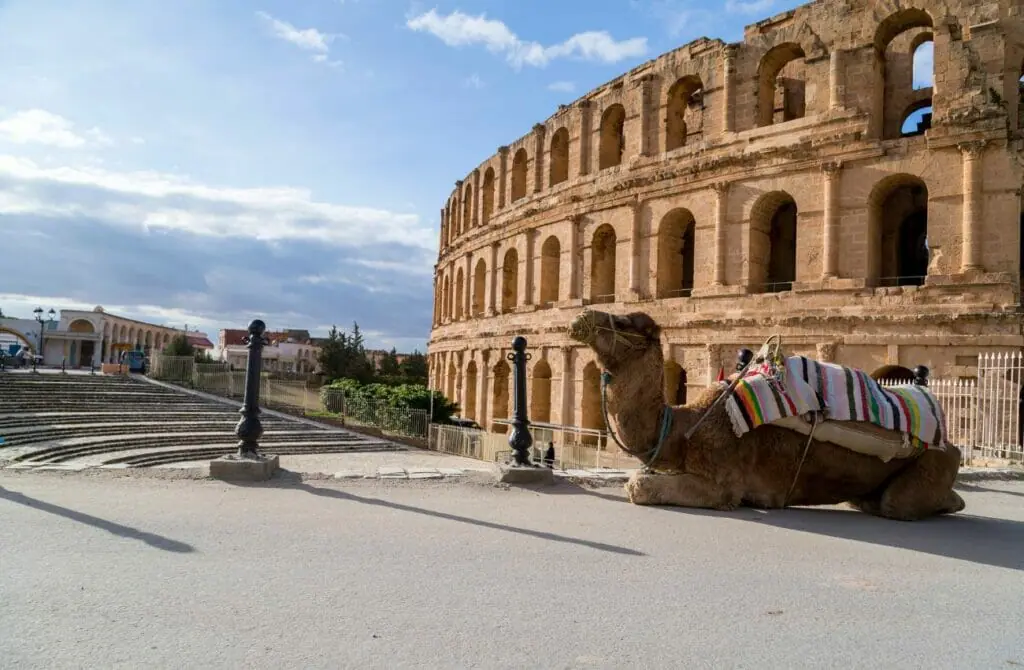
The Colosseum at El Jem was the second-largest in the Roman world, second only to the one in Rome, with an estimated seating capacity of about 35,000. The southern section of the amphitheater is still mostly intact, and visitors can climb up the steps, take a seat, and experience a sense of what it must have felt like as people watched gladiators fight it out down below.
You can also explore the underground passages used as a holding place for animals, gladiators and others deemed to have offended the Roman Republic.
Visit a Palace
Tunis is home to a number of palaces that are a delightful display of the ornate beauty of the architecture of Tunis before modernization. From engraved wooden doorways to lush courtyards and intricate stucco designs, a visit to these palaces is nothing but a sensory delight.
Some of the palaces travelers should definitely check out include the 18th and 19th-century Dar Hussein, Dar Ben Abdallah, Dar Lasram, and Zaouia Sidi Brahim palaces.
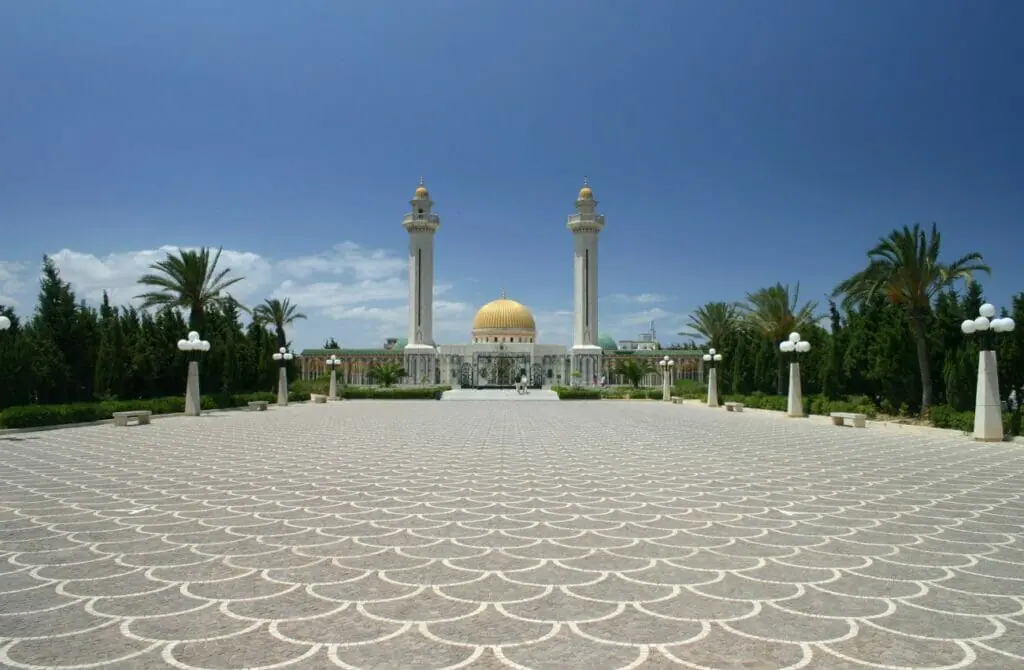
Located about 100 kilometers south of Tunis, Takrouna is a Berber village atop a cliff with panoramic views of extensive farms below. The village offers visitors a taste of traditional life in Tunisia with its stone-cut and dome-roofed village architecture.
The locals can also invite you into their homes to show you their unique traditional interior decor. From Takrouna, travelers can also venture out and check out the Medina and beach at Hammamet, which is located about 45 kilometers northeast.
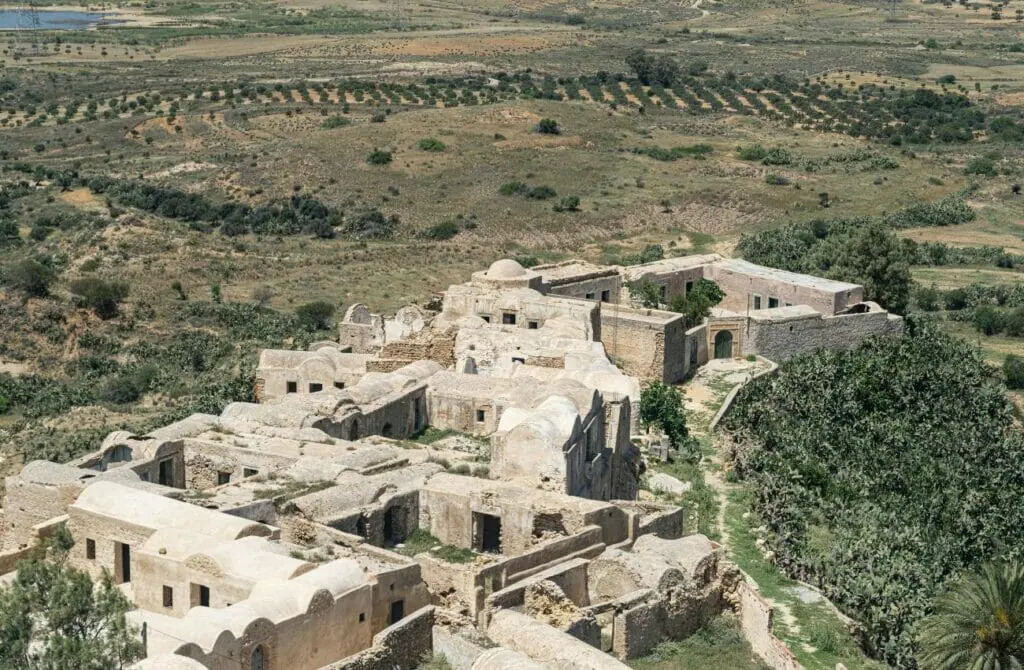

Dougga is a UNESCO World Heritage Site and the best-preserved Roman small town in North Africa. Located about 110 kilometers from Tunis, the city is built on a hillside surrounded by olive trees and farmlands as far as the eye can see.
What makes this city unique is its mixed heritage and influences from the Punic, Numidian-Berber, Byzantine, and ancient Roman eras. Some highlights include the well-preserved Roman Theater, the Temple of Saturn, the Libyco-Punic Mausoleum, and the temples of Saturn, Minerva, and Juno Caelestis. It is best to hire a car and a driver when going out to Dougga.
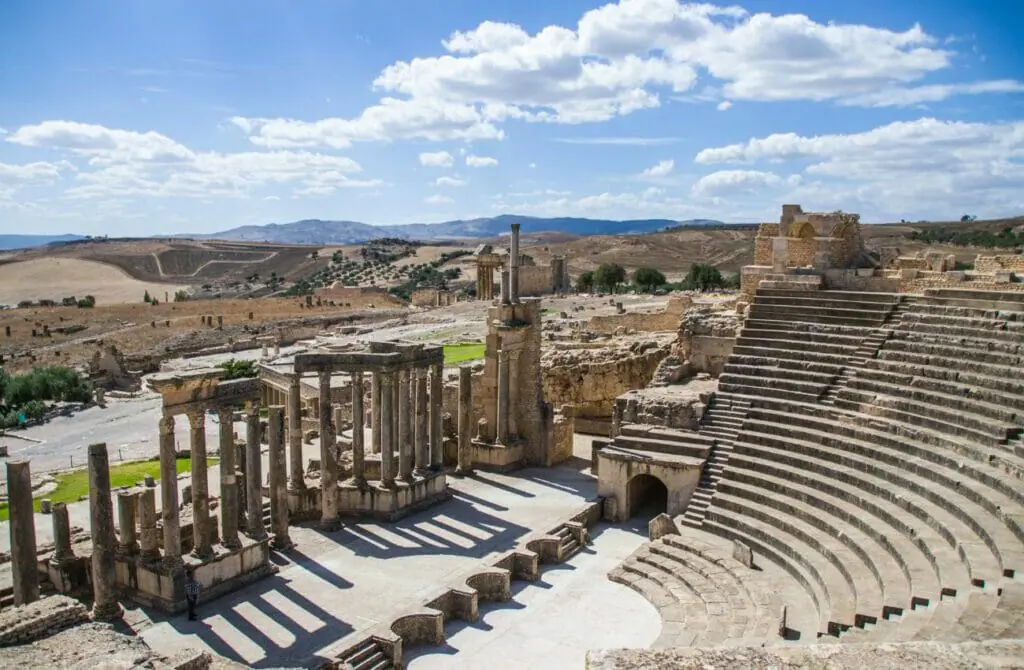
Go Shopping
Tunis is a great shopping destination, and shopping lovers will find a wide selection of art, gift items, and souvenirs to choose from. The Souks in the medina are the perfect place to start for beautiful and authentic hand-made Tunisian products like rugs, perfume, silverware, fabrics, spices, pastries, leather products, jewelry, and clothes.
Shoppers should consider visiting in the morning when there are free people, and the weather is cooler. You will also need to get comfortable with haggling, as it is part of the culture in Tunis. If you are looking for international brands such as Zara, Bershka, Aldo, Stradivarius, Pull & Bear, and LC Waikiki, then you should head either to Avenue Habib Bourguiba, Tunisia Mall, Azure City Mall, or Central Park Mall.
Be warned that the prices in some of these shops will match those you can find anywhere in Europe or North America.
Visit an Ancient Mosque in the Medina District
As a Muslim-majority country, some of the most iconic pieces of architecture in Tunis are its mosques. Most of them will not allow non-muslims to enter the prayer chambers, but you can explore the courtyards and opulent architecture of the buildings.
Starting with the Ez-Zitouna Mosque, the great mosque of the Medina district and the oldest mosque in the city, check out the equally awe-inspiring Kasbah Mosque, the Sidi Mahrez Mosque, and the Youssef Dey Mosque.
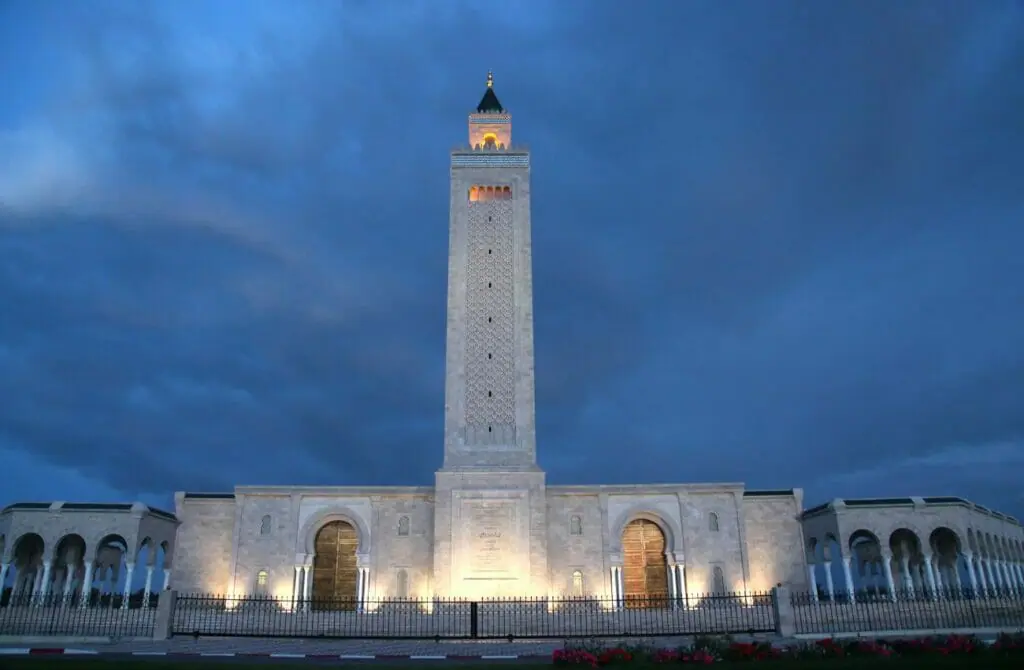

Gay-Friendly Hotels in Tunis, Tunisia
As a traveler in a homophobic country where being gay is illegal, it’s important to be aware of the risks and take necessary precautions to ensure your safety. This includes choosing accommodations that are less likely to have issues with same-sex travelers.
We recommend booking two twin beds and traveling as friends only, avoiding any same-sex activities that could attract unwanted attention. While it’s unfortunate that there are no gay-friendly accommodations in Tunis, we suggest staying at international or high-end properties that are less likely to have issues with LGBTQ+ guests.
It’s important to note that these accommodations are not gay-friendly at all and may not have policies or practices in place to create a safe and inclusive environment for LGBTQ+ guests. However, they are the most fabulous hotels in Tunis, according to other gay travelers and us, and where we recommend staying.
Whatever your needs are, Tunis has a wide range of accommodations to choose from. While it may be challenging to find gay-friendly options, taking these precautions can help ensure a safe and enjoyable stay in the city.
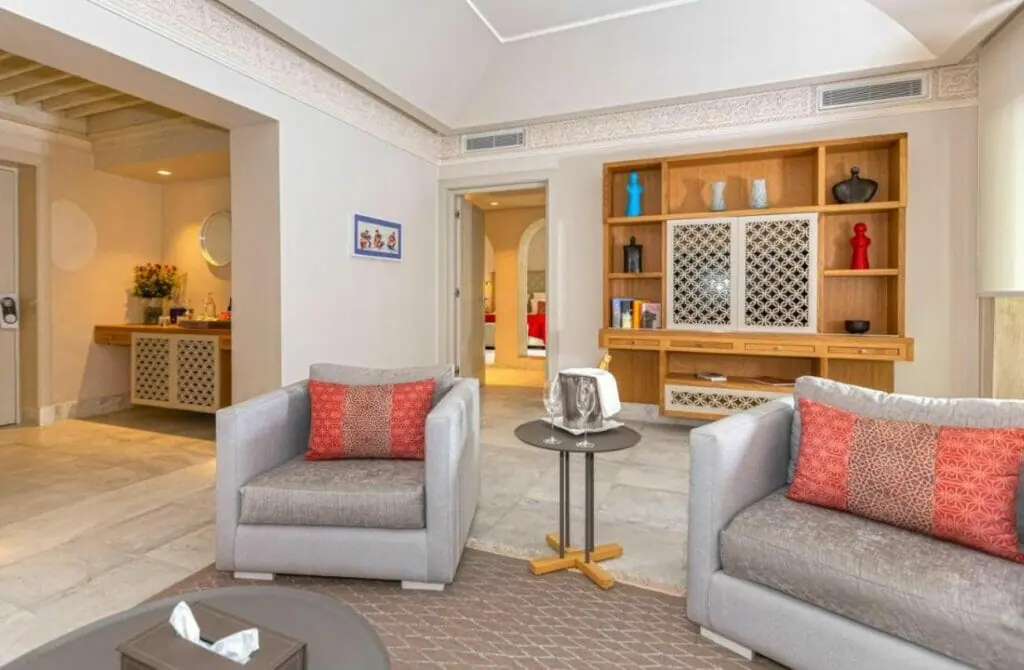
The Dar el Jeld Hôtel & Spa is a luxury boutique hotel located in the heart of the Medina of Tunis. Guests will love the amazing concierge and room service, the elegantly furnished and spacious rooms with marble floors, air conditioning, and a minibar, as well as the beautiful views of the covered souks surrounding the hotel.
Visit their spa for a relaxing massage, and then visit the rooftop bar and restaurant for sumptuous local and international cuisine, great views of the city, and a good selection of Tunisian wines
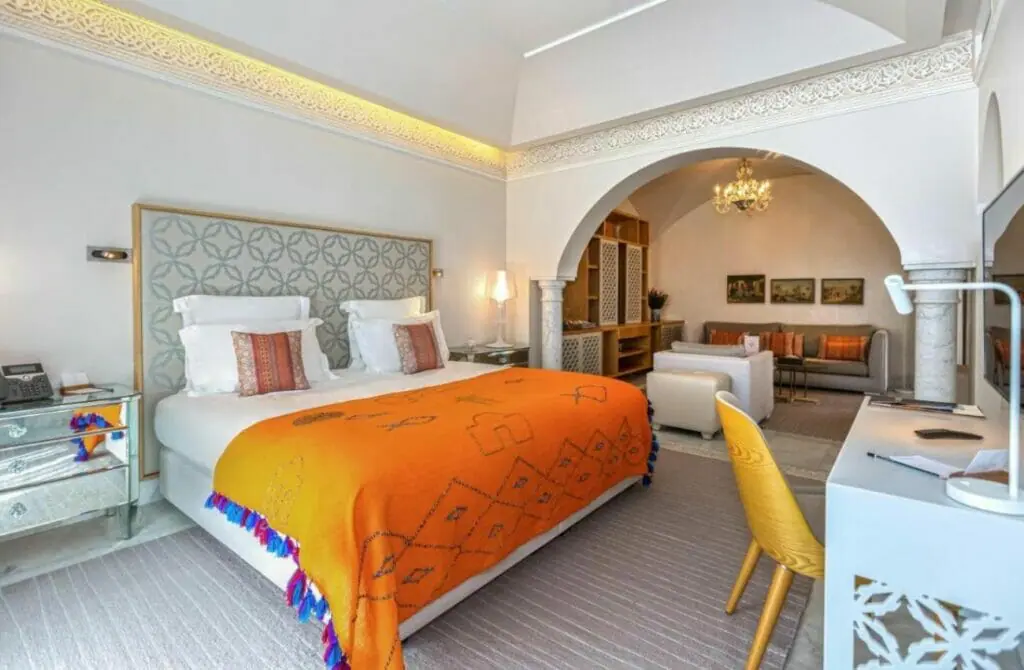
Movenpick Hotel Du Lac Tunis ✰✰✰✰✰
The Movenpick Hotel Du Lac Tunis is located on the waterfront near the Lake of Tunis. The hotel is only minutes away from the Tunis-Carthage International Airport (TUN) and the Tunis city center. Guests will love the warm and welcoming staff and the modern, tastefully furnished rooms.
If you are looking to wind down, you should check out their spacious spa, visit the sports center for a workout, or go poolside for a swim. A highlight is Movenpick Hotel is the chocolate hour which happens every afternoon, where guests get to indulge in the tasty treat.
Hotel Belvedere Fourati is located in the heart of Tunis near Belvedere Park. The staff at this hotel are always smiling and very helpful, and the rooms are spacious and clean with free high-speed internet. Their buffets are amazing, and you can watch the city down below from the terrace in their restaurant. The hotel is within walking distance of malls, banks, and Beldevere Park.
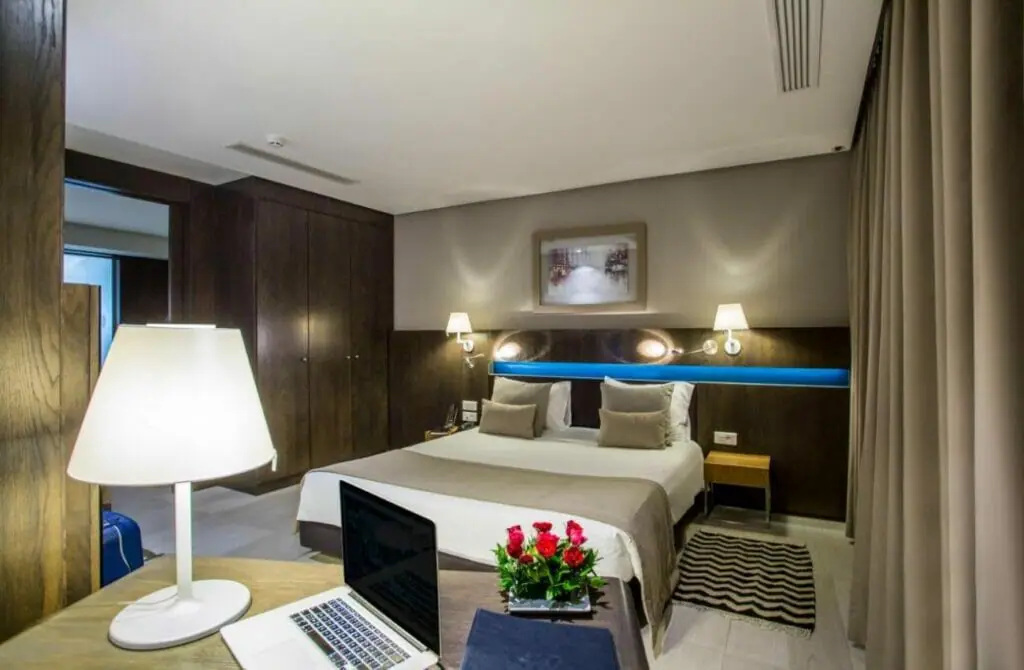
This Auberge El Medina is a hostel located in the Medina District in a traditional house that is 700 years old. The hostel offers simple but clean rooms, a free breakfast buffet, and free wifi. The host and staff are also helpful and will help you get what you need.
Guests can relax in the spacious courtyard with a beautiful dome overhead, take part in group cooking with locals, or venture out into the surrounding souks to look for souvenirs. Guests should also bring their own toilet paper as it is not provided.
The Carlton is a boutique hotel located on Avenue Habib Bourguiba. The hotel has a modern, warm and artsy ambiance with beautiful sculptures, paintings, photography, and street art on the walls and other spots throughout the establishment.
Try their wonderful breakfast as you take in the views of the city and watch Tunisians going about their business. From the hotel, you can walk to many attractions in the city of Tunis as well as cafes, malls, banks, and embassies. Ask the staff for recommendations for places to see.
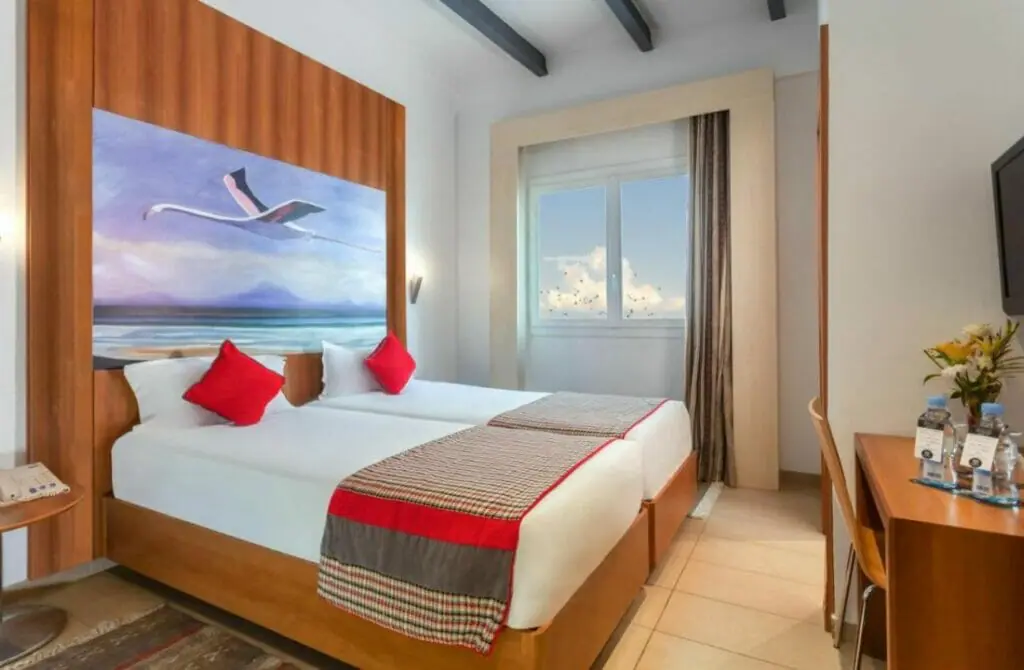
Gay Nightlife in Tunis, Tunisia
There is simply no gay nightlife to be found in the city of Tunis thanks to restrive laws and the conservative attitudes and culture in the country. Finding other queer people in Tunis can be a tricky, even dangerous, undertaking. However, there are a few places where gay travelers can have a great time out at night in Tunis and maybe, just maybe, bump into other queer people, both local and visiting.
While exploring the nightlife of a new city can be exciting, it’s important to remember that Gay Tunis is a city in a country where same-sex activity is illegal, and being queer is not accepted in public. As such, it’s crucial to avoid any displays of queerness or same-sex activity in public.
However, you can still enjoy the ‘straight’ nightlife in Gay Tunis as you would in any other city. You can meet new people, try new things, and get a taste of the local culture without attracting unwanted attention.
Whether you’re dancing at a club or mingling at a bar, remember to be respectful of the local culture and avoid any behavior that may be seen as queer or same-sex activity. By doing so, you can have a fun and memorable experience while still being mindful of the local laws and customs.
So, step out of your comfort zone and explore the nightlife in Gay Tunis, but remember to do so as a non-queer traveler. Enjoy the city’s nightlife while being respectful of the local culture and avoiding any displays of queerness or same-sex activity in public.
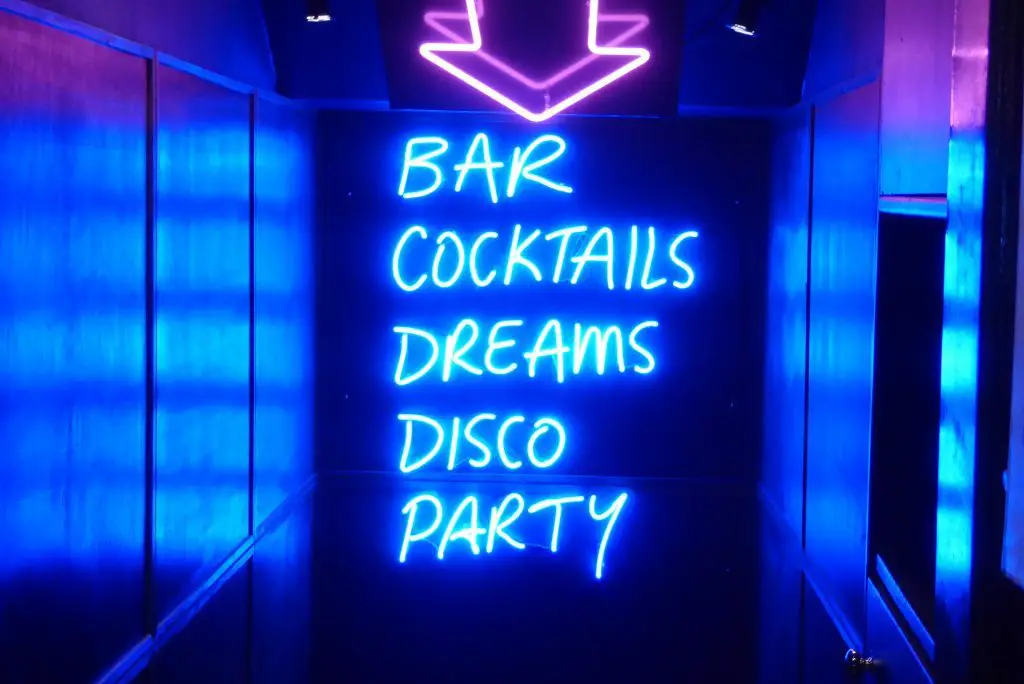

Gay Bars, Clubs & Parties In Tunis
For an authentic experience of a traditional Arabian cafe, you should visit Café El M’rabet, an establishment dating back to the 17th century.
Located within the Medina of Tunis, the cafe feels like a palace with ornate carpets and cushions around low tables, high ceilings supported by beautifully carved pillars, and Moroccan lamps creating a warm ambiance inside. Guests can also sit at their tranquil courtyard terrace outside and savor their popular Arabian coffee and shisha while taking in views of the surrounding souks.
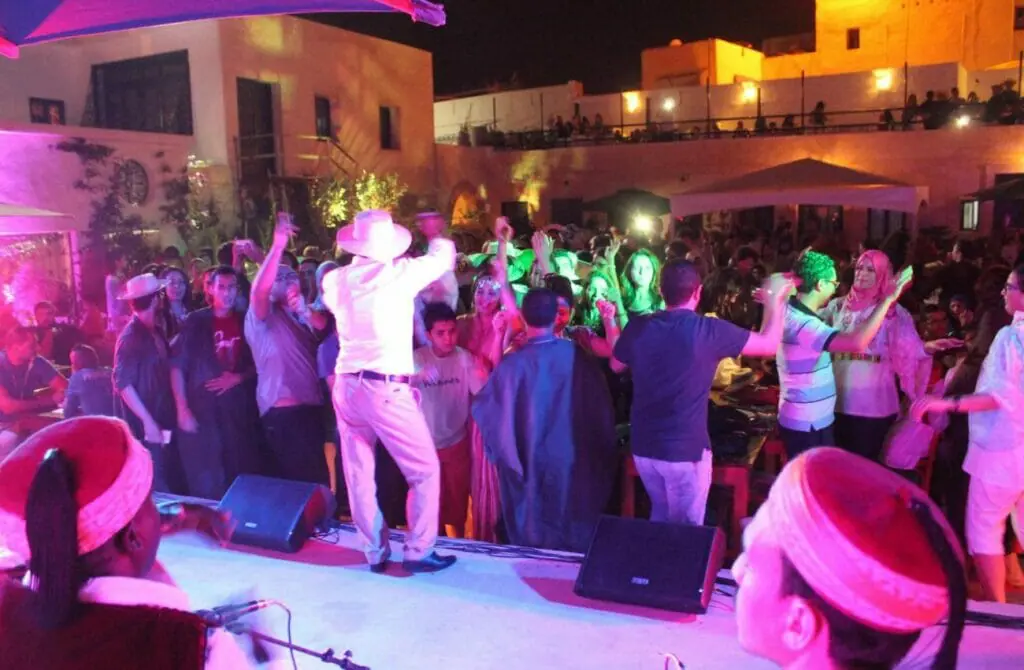
Cafe de Paris is a restaurant and bar located along Avenue Habib Bourguiba that is frequented almost exclusively by men. They serve French and Mediterranean food, which you can have on their outdoor terrace, which is the perfect spot for people-watching in Tunis.
The atmosphere at the bar is lively, and you will find a decent variety of wines and beers. This cafe is a great place to meet and chat with local Tunisians, who are very friendly.
The Le Boeuf Sur Le Toit is a rustic and artsy space with a music pub, restaurant, and outside terrace that is located along 3 Avenue Fattouma Bourguiba. This is a great place to party that attracts a mostly young and trendy crowd.
The bar area is named Buffy and has a long table made out of metal where guests sit and chat or bang on with spoons and folks as they sing along to music from the live percussion band. The upbeat vibe makes this the ideal spot for a wild night out, and it can get crowded, especially on weekends.
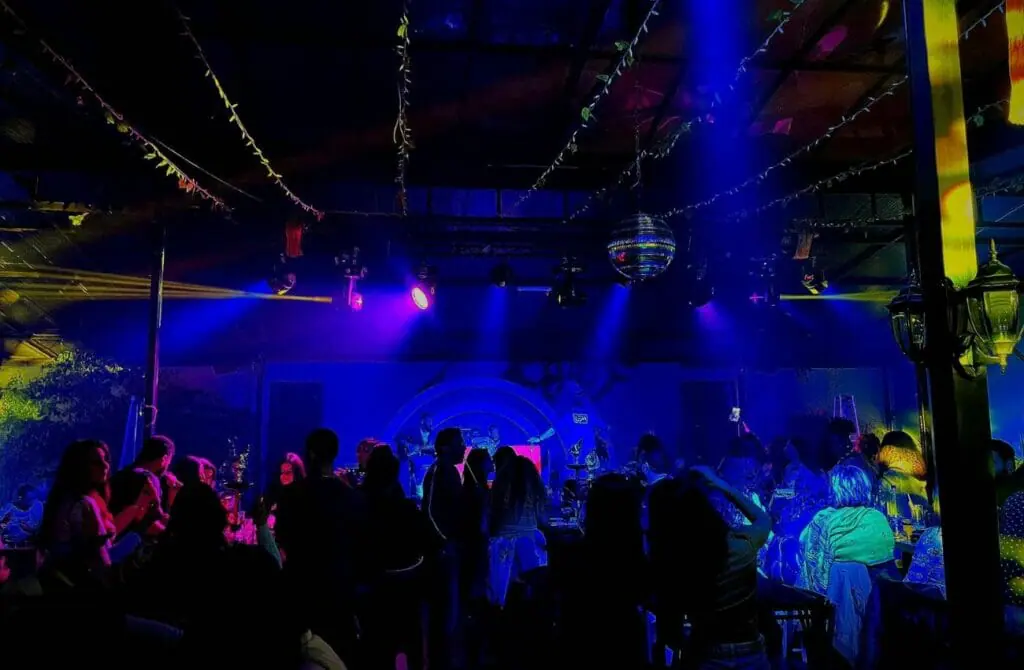
Located on Route de Gammarth in La Marsa, this spot starts out as a cozy, laid-back evening venue where you can chill and wind down after a busy day. As the evening progresses, expect upbeat music from the DJ or from a live band and a young university-type crowd having a good time.
The interior decor on the inside is industrial, while the outside garden is surrounded by palm and is the best spot to take in the beautiful sky as you savor their delicious sushi and tapas.
Bar Jamaica
(Temporarily or permanently closed. If you know something, please suggest an edit.)
You will find the Jamaica bar on the 10th floor of the El-Hana Hotel, bathed in funky blue neon lights and offering unbeatable views of the city of Tunis. Ask for a beer or martini and groove to lounge and pop music from the DJ as you mingle and chat with other revelers. Bar Jamaica is the perfect spot for a fun night out, but as a bar targeted at tourists and young wealthy Tunisians, it is one of the pricier places to hang out.
This chic and trendy nightclub is located in Carthage near the Soukra golf course. Go to Don Papa for their Instagram-worthy interior decor, great music, and tasty cocktails.
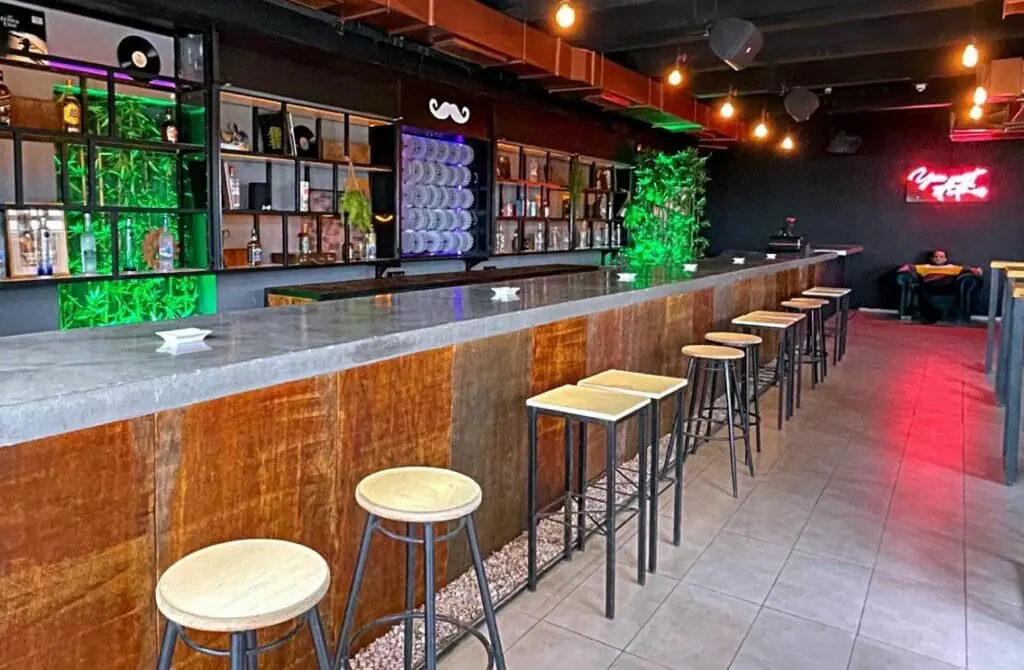
Located along Rue Abou Firas Alhamdani, this spot arguably has one of the best quality shishas in Tunis. The price for shisha here is relatively higher than at other spots, but it is worth it because it is prepared with quality charcoal and premium tobacco. Guests will also enjoy the friendly staff, good music, and comfy seating.
Plaza Corniche Bar & Nightclub
The Plaza Hotel is a palm tree paradise located in La Marsa near the sea that is very popular with people looking for a good time out. Visit the bar for a chill drinking atmosphere and great sea views, and then check out the dancefloor in the nightclub downstairs.
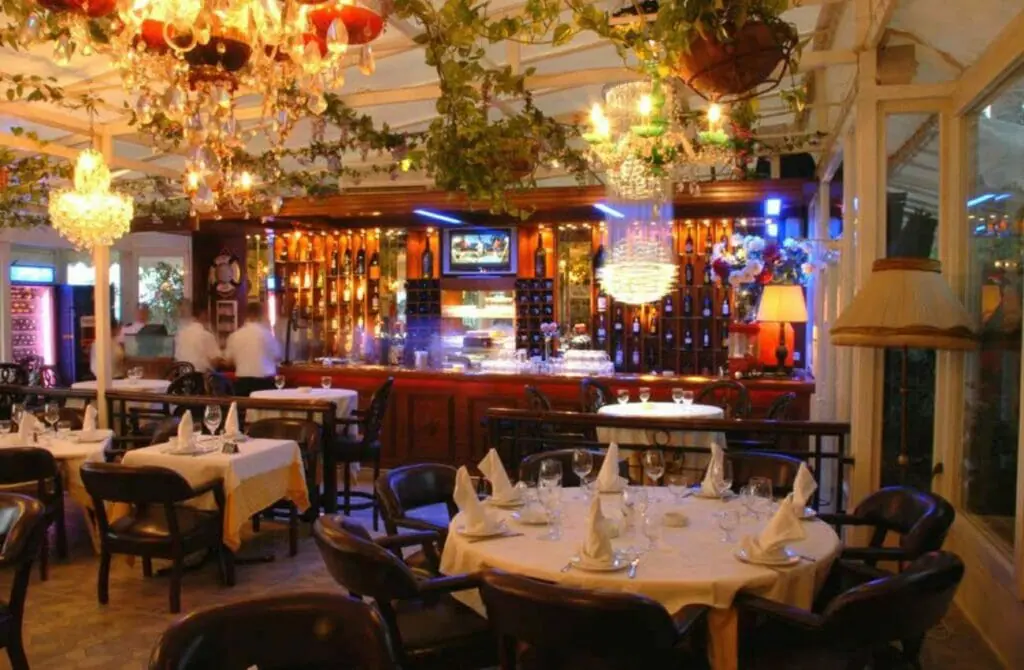

Gay Map Of Tunis
Finding it hard to envisage where everything is in Tunis? Hopefully, this queer-centric map helps where we have marked all the bars, clubs, parties, hotels, saunas, massages and more will help you stay in the spot best suited to you!

